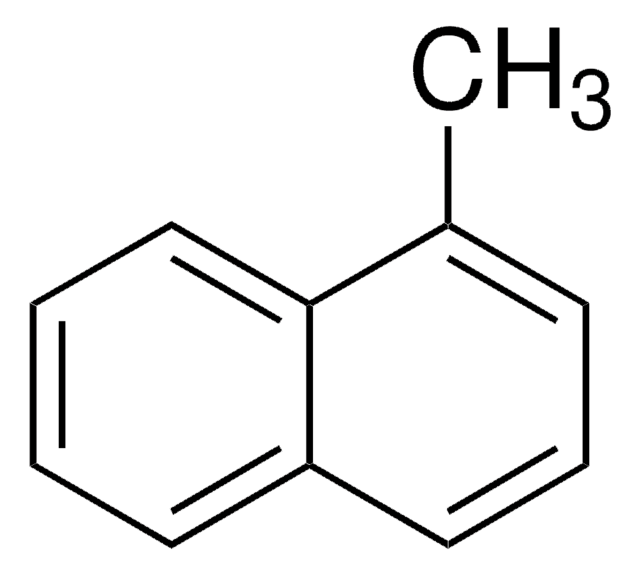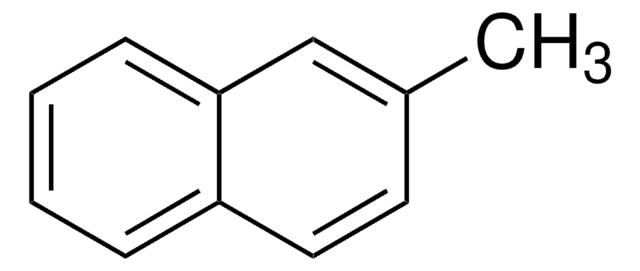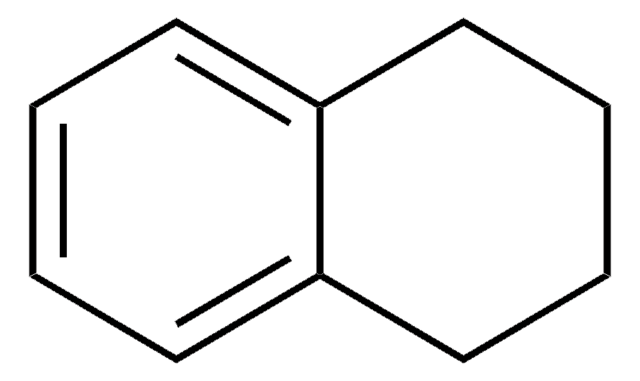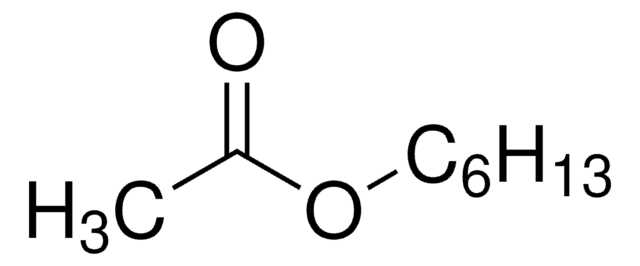45795
1-Methylnaphthalene
analytical standard
About This Item
Productos recomendados
grade
analytical standard
Quality Level
assay
≥98%
autoignition temp.
984 °F
shelf life
limited shelf life, expiry date on the label
technique(s)
HPLC: suitable
gas chromatography (GC): suitable
refractive index
n20/D 1.615 (lit.)
bp
240-243 °C (lit.)
mp
−22 °C (lit.)
density
1.001 g/mL at 25 °C (lit.)
application(s)
environmental
format
neat
SMILES string
Cc1cccc2ccccc12
InChI
1S/C11H10/c1-9-5-4-7-10-6-2-3-8-11(9)10/h2-8H,1H3
InChI key
QPUYECUOLPXSFR-UHFFFAOYSA-N
¿Está buscando productos similares? Visita Guía de comparación de productos
Application
The 1-Methylnaphthalene may find the following uses:
- Study of surface and electronic features of fluorinated TiO2 and their influence on the photocatalytic degradation of 1-methylnaphthalene
- Thermal decomposition of 1-Methylnaphthalene in a batch reactor
- Catalytic conversion of tar from hot coke oven gas using 1-methylnaphthalene as a tar model compound
- Hydrocracking of 1-methylnaphthalene to benzene, toluene, and xylene using high metal–acid balance and selective hydrogenation activity catalysts
Recommended products
signalword
Danger
hcodes
Hazard Classifications
Acute Tox. 4 Oral - Aquatic Chronic 2 - Asp. Tox. 1
Storage Class
10 - Combustible liquids
wgk_germany
WGK 2
flash_point_f
179.6 °F - closed cup
flash_point_c
82 °C - closed cup
ppe
Eyeshields, Faceshields, Gloves, type ABEK (EN14387) respirator filter
Elija entre una de las versiones más recientes:
Certificados de análisis (COA)
¿No ve la versión correcta?
Si necesita una versión concreta, puede buscar un certificado específico por el número de lote.
¿Ya tiene este producto?
Encuentre la documentación para los productos que ha comprado recientemente en la Biblioteca de documentos.
Los clientes también vieron
Protocolos
GC Analysis of Polynuclear Aromatic Hydrocarbons (PAHs) in Salmon on SPB®-608 (20 m x 0.18 mm I.D., 0.18 µm) after QuEChERS Cleanup using Supel™ QuE Z-Sep, Fast GC Analysis
Protocol for GC Analysis of Hydrocarbons in Gasoline on Petrocol® DH
US EPA Method 8270 (Appendix IX): GC Analysis of Semivolatiles on Equity®-5 (30 m x 0.25 mm I.D., 0.50 μm)
GC Analysis of Hydrocarbons in Gasoline on Petrocol® DH, Isothermal
Nuestro equipo de científicos tiene experiencia en todas las áreas de investigación: Ciencias de la vida, Ciencia de los materiales, Síntesis química, Cromatografía, Analítica y muchas otras.
Póngase en contacto con el Servicio técnico









